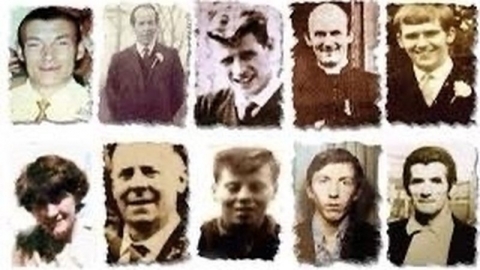Innocent civilians killed by British Army in Belfast in 1971 - inquiry finding

The Ballymurphy Massacre took place in August 1971 when during a British army operation 10 people were shot dead in Belfast. On May 11th 2021 a judge-led inquiry found that British soldiers unjustifiably shot or used disproportionate force in the deaths of nine of the 10 innocent people killed. Mrs Justice Siobhán Keegan also criticised the lack of investigation into the 10th death, that of John McKerr, and said she could not definitively rule who had shot him. It has taken fifty years of campaigning by the families of the victims to get some kind of justice.
The Ballymurphy massacre was a series of incidents between 9 and 11 August 1971. The civilians were killed in Ballymurphy, Belfast in the north of Ireland by members of the 1st Battalion, Parachute Regiment of the British Army. This was all part of Operation Demetrius internment without trial strategy being conducted by the British at the time. This same battalion was also involved in the killing of 14 civilians in Derry a few months later in what became known as Bloody Sunday. The ten killed at Ballymurphy were Francis Quinn, Fr Hugh Mullan, Noel Phillips, Joan Connolly, Daniel Teggart, Joseph Murphy, Edward Doherty, John Laverty, Joseph Corr and John James McKerr. An 11th victim, Pat McCarthy, died of a heart attack. Father Hugh Mullan, the 38-year-old priest who died, was helping an injured man and waving a white object before he was shot twice in the back, the inquiry found.
Last week’s verdict in the inquest into the Ballymurphy massacre was clear in declaring that the people shot dead during British army operations were innocent, unarmed civilians. On Wednesday after the verdict the British Prime Minister Boris Johnson “apologised unreservedly on behalf of the UK government for the events that took place in Ballymurphy”. However, it has taken fifty years to get to this point in regard to Ballymurphy. As Judge Keegan pointed out it was "shocking" that the state did not carry out a proper investigation into the killing. She also added that questions remain unanswered about the identity of the soldiers who shot many of the victims. No one has been charged or convicted in connection with any of the killings. In the end, as important as it was, the inquest was a fact-finding exercise and not a criminal trial.
There are also other unresolved killings that have to be properly investigated. Even though this verdict gives a damning judgment on the actions of the British army, the British government has previously signalled its intention to end prosecutions of soldiers suspected of murdering in Northern Ireland before the Good Friday agreement. It has been acknowledged that it was a difficult environment for many soldiers sent by their government into a situation of which they had little understanding or that they were viewed by large sections of the poplutation as an occupying force. Between August 1969 and July 2007 they had clearly at different times come under fire from gunmen and a number killed. However, the British Army cannot justify killing defenceless people. In fact their actions strengthened the Provisional I.R.A., increased nationalist resentment and hostility toward the Army and exacerbated the violent conflict of the years that followed.
Link and Image: Victims of Ballymurphy Massacre image courtesy of Raidió Teilifís Éireann (RTÉ). No one has ever been charged or convicted in connection with any of their deaths.





